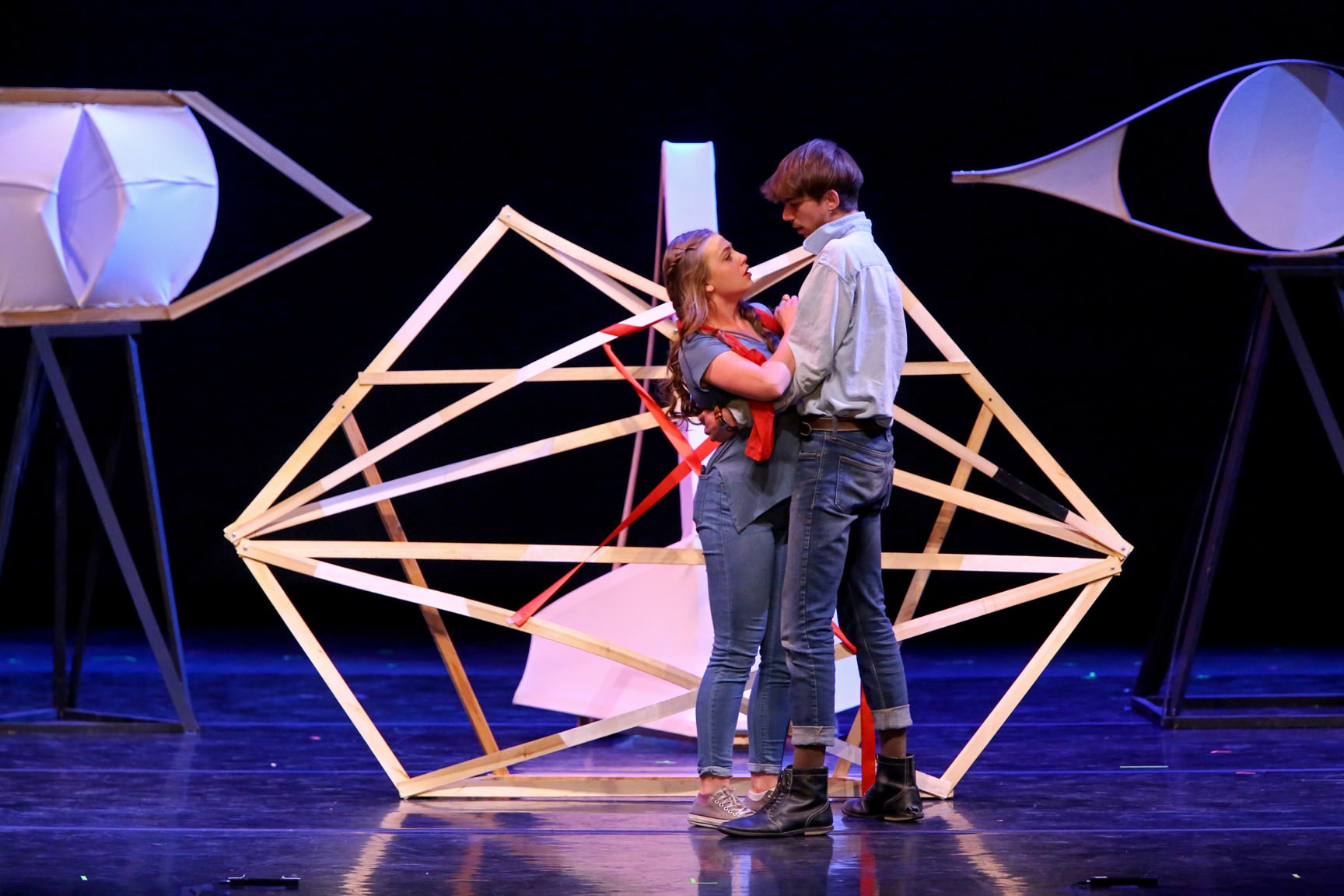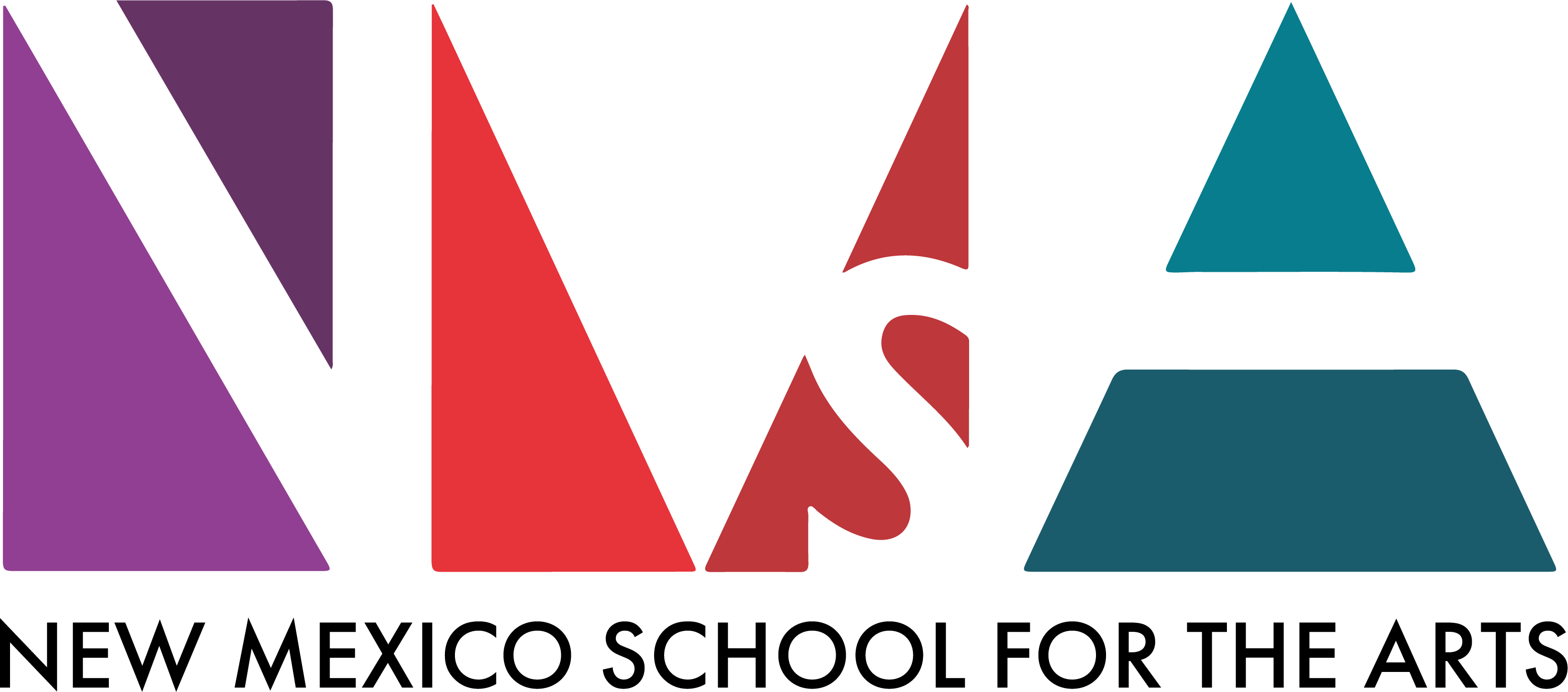Theatre
The NMSA Theatre Department offers a diversified and rigorous curriculum that fosters independent thinking in a challenging and creative community to prepare emerging artists for higher education and professions in the theatre arts for stage, film and television.
The program focuses on developing the art of storytelling through practice and performance. Students learn their role as artists in creating a narrative, understanding the scope and sequence of developing characters and performances, and their personal expression as part of the larger whole.
Students gain the basic physical, vocal, and mental techniques necessary to develop and maintain believable characters in a variety of styles and genres. They explore movement, vocal styles, and systems of character development, textual analysis, playwriting, directing, theater history, monologues, and college audition preparation. The program focuses on developing the complete performer through exploration, exercises, improvisation, scene study, and performances.
The department follows a conservatory style of cohort training and is on a trimester schedule. Programming is sequenced to begin with the fundamentals of voice, body and mind, and moves towards mastery of a number of skills and techniques over a four-year course of study. By the end of their studies, students will have acquired 1,980 hours of classroom instruction, as well as additional production experience.

Guest Artist Program
We believe a student’s passion for the arts can propel them to success in every aspect of life. We are committed to fostering that success by providing a strong foundation for artistic and academic growth in an inclusive and challenging environment that encourages exploration, expands imagination and cultivates creativity.

Barbara Hatch
Theatre Department Chair
barbara.hatch@nmsa-ai.org
If you have questions regarding curriculum or anything about the Theatre program, please contact Barbara Hatch or use our Contact form and someone from the team will respond shortly.
Theatre Fundamentals
GRADE LEVEL 9/Year 1
Students in theater fundamentals will learn basic acting terminology and techniques, including basic theater terms, skills of observation and listening, the rules of play, presence, focus, economy, timing, and instinct. These techniques and skills, applied in the first year of the course, will form the basis upon which additional training is built.
Character Development
Trimester 2
Students in this class will explore several different in-depth techniques of developing an original character including, vocal placement, abstract and animal imagery, and center of energy. Students will be required to present a written character sketch and then transfer information to a BENT sheet based on Aristotle’s The Poetics. Students will complete the trimester with a unit of “working in silence and stillness” to understand the phenomenon of allowing a moment to fully manifest. All techniques and styles can also be used in developing a character from a text.
Singing for Actors
Trimester 3
In this course, students practice engaging the voice and breath through song. By singing together chorally and developing their own vocal final projects, students push past mental barriers and are prepared to begin the work of using their voice fully in performance.
Movement for Actors
This course is designed to engage actors in a curious exploration of their physical limits and the connection between their imagination and their bodies. Over the course of ten weeks we will play, sweat, improvise, create, reflect, stretch and sweat some more. In addition to games, exercises and improvisations, we will draw on the work of Jacques Lecoq (Neutral mask), Anne Bogart (Viewpoints) and Ruth Zaporah (Action Theater) as we stretch inward and outward.
Production Wheel, Year 1
Full Year
This unique period of every afternoon is where students in a production are in rehearsals and all other students are taking mini-wheel classes anywhere from 1 to 6 weeks in length. Offerings in the past have included: Stage Makeup, Masks, Viewpoints, Theatrical Clown, Alexander Technique, Meisner, Long and Short Form Improvisation, Voice and Diction, Singing and Conditioning, Comedy and Devised Work.
Scene Study and Textual Analysis
GRADE LEVEL 10/ Year 2
Trimester 1
This course is designed to prepare the student for playwriting. Students will understand Aristotle’s Poetics and the first rules of drama, as well as dramatic structure – Exposition, Inciting Incident, Rising Action, Climax, Denouement and Resolution. Students will understand what the spine (or super-objective) of a play is, along with objective, goal and action. Students will learn how to analyze a script and characters by breaking them down to the smallest units of action, beats, and scenes and will then work with established texts and complete the unit by performing materials which have been analyzed. The improvisational portion of the course offers students the opportunity to explore additional character range, beat changes and showcases the actor’s ability to risk and play. All aspects of building a scene, from blocking, to character development to scene breakdown will be covered. Students will be trained in how to analyze a scene, a full script or a monologue in order to present a fully fleshed-out scene with beats clearly understood and shown.
Playwriting
Trimester 2
Students will read and analyze a full length play to gain a better understanding of dramatic structure and develop a common language regarding character, relationships, and the art of storytelling. Students will write and share works throughout the trimester which will conclude by writing and editing a one-act play to be presented to the public in the spring one-act festival.
Introduction to Theatrical Styles
Trimester 3
This course is designed to introduce the young actor to different Theatrical Styles. Often when we think of theatrical style, we think of bloomers and petticoats, or perhaps an avant-garde silent movement piece; we think of extreme design choices or provocative writing. However, all plays have a style. That means that “theatrical style” cannot be boiled down to genre, time period, or costume choices. Style refers to the overall approach and feeling of a piece, and an actor must be able to adjust their craft to be able to match with the rest of the play they are in. In this class, students will explore different texts from plays that span theatrical history within three genres: realism, tragedy, and clowning. These different genres will allow students to explore different levels of play physically, vocally, and expressively. Texts will be chosen from different time periods and geographic places, spanning from contemporary plays to Shakespeare’s time.
Introduction to Shakespeare
This course is an introduction to techniques useful for approaching Shakespeare’s work from the point of view of the actor. Shakespeare’s verse dramas were written to be performed and when they are approached as playable, theatrical texts they can be richly rewarding. Through text analysis, scene study, vocal work, and acting exercises we attempt to find, not only the meaning, but the music and theatrical power of Shakespeare’s words. We will explore blank verse, spining, scansion, phrasing, word emphasis, antithesis, and imagery.
Production Wheel, Year 2
Full Year
This unique period of every afternoon is where students in a production are in rehearsals and all other students are taking mini-wheel classes anywhere from 1 to 6 weeks in length. Offerings in the past have included: Stage Makeup, Masks, Viewpoints, Theatrical Clown, Alexander Technique, Meisner, Long and Short Form Improvisation, Voice and Diction, Singing and Conditioning, Comedy and Devised Work.
Monologues I, Audition Technique
GRADE LEVEL 11 / Year 3
Trimester 1
This course prepares the young actor for college level and professional auditions. Students will be trained in cold reading and guided in the selection of appropriate audition material, and will develop two contrasting pieces (one modern, one classic) as is customary. Proper audition etiquette, accompanying materials including headshots and resume formatting will be covered. Introduction to Shakespeare: This course is an introduction to techniques useful for approaching Shakespeare’s work from the point of view of the actor. Shakespeare’s verse dramas were written to be performed and when they are approached as playable, theatrical texts they can be richly rewarding. Through text analysis, scene study, vocal work, and acting exercises we attempt to find, not only the meaning, but the music and theatrical power of Shakespeare’s words. We will explore blank verse, spining, scansion, phrasing, word emphasis, antithesis, and imagery.
Theatre History
Trimester 2
This course is designed so that the student has a broad understanding of the history of theatre starting with primitive theatre, the Greeks and Romans, through Commedia dell’Arte, Medieval Theatre, Romanticism and the Restoration – through contemporary times. Styles of theatre from beyond Europe will also be touched upon (eg. Japan Kabuki and Noh). The student will gain an appreciation of how theatrical styles have evolved over the centuries throughout the world and in the United States. Students will have a strong understanding of the history of theatre, including the various forms theater has taken over the years, and the historical context that these forms have taken. Students will have recreated and be able to distinguish theater spaces and architectural elements. Students will have a developed a strong vocabulary around theater history. The course will culminate with a performance/written project in one of the eras studied.
Acting for Camera
Trimester 3
This course prepares students in basic camera acting techniques. Students are trained on how to audition for casting directors and to work professionally on a film or television set. In addition to developing acting techniques geared toward camera work, students also learn about the acting profession in the world of film and television, how to get an agent, and how to best increase their chances of getting onscreen work.
Production Wheel, Year 3
Full Year
This unique period of every afternoon is where students in a production are in rehearsals and all other students are taking mini-wheel classes anywhere from 1 to 6 weeks in length. Offerings in the past have included: Stage Makeup, Masks, Viewpoints, Theatrical Clown, Alexander Technique, Meisner, Long and Short Form Improvisation, Voice and Diction, Singing and Conditioning, Comedy and Devised Work.
Monologues II, College Audition Prep
GRADE LEVEL 12 / Year 4
Trimester 1
This class will complement and build on the skills and techniques learned in the Monologues I class. Students will be required to find, cut and craft 3 new monologues, classical, contemporary and a reach piece. These monologues will be presented to a panel of industry professionals in a mock college audition setting including an interview. Students will also craft professional picture and resumes which can be used for college and professional auditions.
Directing
Trimester 2
This course is an introduction to directing with a focus on discovering the text through: finding the dramatic action, the rehearsal experience, analyzing the script, working with your collaborators, creating a production calendar, and directing a final project. There are different expectations for a director depending on the company or educational institution. No matter their level of directing experience before beginning, by the end of the class students will have a deeper understanding of both the artistic and practical concepts necessary to produce a successful production.
Senior Projects
Trimester 3
As the culminating project for seniors having completed four years of training at NMSA, the Senior Project is designed to showcase the collected knowledge gained by the student during his/her time here at NMSA. Each senior will be creating an original piece that will reflect the training they have received. This is a very personal performance and can be a monologue, short play, or other form of expression where the student displays their willingness to take risks and their personal and artistic growth. The instructor will help guide the seniors as they develop original material, which will then be shown in performance at the end of the trimester.
Production Wheel, Year 4
Full Year
This unique period of every afternoon is where students in a production are in rehearsals and all other students are taking mini-wheel classes anywhere from 1 to 6 weeks in length. Offerings in the past have included: Stage Makeup, Masks, Viewpoints, Theatrical Clown, Alexander Technique, Meisner, Long and Short Form Improvisation, Voice and Diction, Singing and Conditioning, Comedy and Devised Work.
